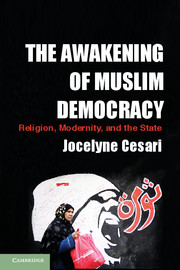Book contents
- Frontmatter
- Contents
- Acknowledgments
- Preface
- Part I THE MAKING OF ISLAM AS A MODERN RELIGION
- 1 Modernization and Politicization of Religion
- 2 Nation-State Building and the Inclusion of Muslim Polities within the Westphalian Order
- 3 Islam in the Constitution
- 4 Nationalization of Islamic Institutions and Clerics
- 5 Islam in the Legal System
- 6 Teaching Islam in Public Schools
- Part II ISLAMISM AS THE PREEMINENT POLITICAL FORCE PRE– AND POST–ARAB SPRING
- Part III THE DISJUNCTION OF DEMOCRACY AND SECULARISM – LESSONS LEARNED FROM THE ARAB SPRING
- Appendix I Religious Violence Index
- Appendix II Egyptian Constitution, Ratified on December 26, 2012. Suspended on July 3, 2013
- Bibliography
- Index
- References
5 - Islam in the Legal System
Published online by Cambridge University Press: 05 July 2014
- Frontmatter
- Contents
- Acknowledgments
- Preface
- Part I THE MAKING OF ISLAM AS A MODERN RELIGION
- 1 Modernization and Politicization of Religion
- 2 Nation-State Building and the Inclusion of Muslim Polities within the Westphalian Order
- 3 Islam in the Constitution
- 4 Nationalization of Islamic Institutions and Clerics
- 5 Islam in the Legal System
- 6 Teaching Islam in Public Schools
- Part II ISLAMISM AS THE PREEMINENT POLITICAL FORCE PRE– AND POST–ARAB SPRING
- Part III THE DISJUNCTION OF DEMOCRACY AND SECULARISM – LESSONS LEARNED FROM THE ARAB SPRING
- Appendix I Religious Violence Index
- Appendix II Egyptian Constitution, Ratified on December 26, 2012. Suspended on July 3, 2013
- Bibliography
- Index
- References
Summary
The integration of the waqf and maddrasa into the new state system irremediably changed the status of religious authorities.
Additionally, the content and methods of legal-religious work were deeply transformed by the building of new institutions. In other words, a radical transformation of Shariʿa occurred through its codification as well as its reduction to mostly family law. The consequence has been the hybridization of secular and religious references in civil legislation and the shaping of public virtues by Islamic references, which has contributed to the resurgence of apostasy and blasphemy cases in the past three decades.
CODIFICATION AND REDUCTION OF SHARIʿA
With the collapse of the Ottoman Empire, Shariʿa courts in the new nation-states were eliminated and replaced by secular legislation in almost all aspects of social, economic, and penal domains.
In Turkey, Shariʿa courts were dismantled upon independence in conjunction with the abolition of the caliphate, and all religious courts were subordinated to the Ministry of Justice. In 1926, a legal codification based on different European models replaced traditional Islamic jurisprudence. In the Maghreb, Morocco, Tunisia, and Algeria adopted the French legal model, which helped maximize state control over the legal system upon independence. In Egypt, soon after Nasser’s revolution, under Law 462 of 1955, Shariʿa courts along with all milliya (Christian ecclesiastical and Jewish rabbinical communal courts) were abolished. In Iraq, in 1970, Saddam Hussein stripped the Shariʿa courts of their power and incorporated the personal status courts into the regular court system while maintaining the 1959 Iraqi Law of Personal Status, which is based on Islamic law and continues in post-Saddam Iraq.
- Type
- Chapter
- Information
- The Awakening of Muslim DemocracyReligion, Modernity, and the State, pp. 60 - 84Publisher: Cambridge University PressPrint publication year: 2014



